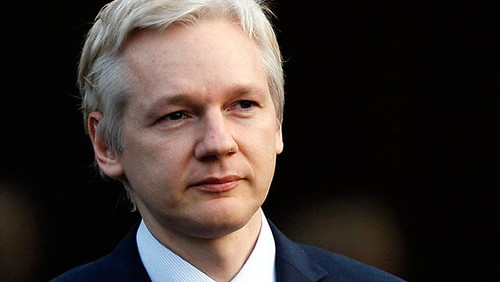From Consortium News
A British court proceeding on a freedom of information request regarding how the Crown Prosecution Service (CPS) dealt with the case of WikiLeaks editor Julian Assange has revealed that CPS deleted relevant emails from the account of a now-retired CPS lawyer, Paul Close.
However, one email that wasn't destroyed shows the CPS lawyer advising Swedish prosecutor Marianne Ny not to interview Assange in London, a decision that has helped keep Assange stuck for more than five years in Ecuador's London embassy where he had been granted asylum. Finally, in late 2016, after Swedish prosecutors did question Assange at the embassy, they dropped sex abuse allegations against him, but he still faces possible arrest in the U.K. as well as potential extradition to the U.S., where officials have denounced him for releasing classified material.
Italian journalist Stefania Maurizi, who has worked on WikiLeaks disclosures as a media partner since 2009, has made freedom of information requests in several countries regarding the Assange case. On Monday, I spoke with Estelle Dehon, a lawyer for Maurizi and Assange.
Dennis Bernstein: You represented Julian Assange and Stefania Maurizi in court today. Give us the background, what got you into court today?
Estelle Dehon: It has to do with access to information. In the United States there is legislation which can allow individuals to have access to official information held by public authorities. We have the same type of system in the United Kingdom.
My client, the extraordinary Italian investigative journalist Stefania Maurizi, made a freedom of information request to the Crown Prosecution Service for information about Julian Assange. In particular, she was asking for copies of correspondence between the Crown Prosecution Service and the Swedish prosecution authorities and any correspondence with the US State Department, the Department of Justice, or the state of Ecuador. Obviously, this all relates to the situation that has occurred with Mr. Assange being arbitrarily detained in the Ecuadorian embassy.
Dennis Bernstein: There were revelations just a week or two ago that some of the key information you are seeking has been destroyed.
Estelle Dehon: Information has been coming out piecemeal. Initially, the Crown Prosecution Service refused to provide anything. As the appeal has been going forward before the tribunal, they started to release information. Just last week we were informed that the email account of the main lawyer in the case who was corresponding with the Swedish Prosecution Authority was deleted when he retired from the Crown Prosecution Service in 2014. One of the things we were asking today was how that could possibly have taken place. We had been told that the extradition matter had come to an end when the Supreme Court in 2012 upheld the arrest warrant for Mr. Assange.
So on the one hand the Crown Prosecution Service is saying that at that point the extradition matter we were dealing with came to an end. But on the other hand, they are saying, as a way of resisting full disclosure, that the extradition matter is ongoing. So which is it? If this is a case that is closed, in which case emails can be deleted then in the public interest, as much information as possible should be released. And if this is a case that is ongoing, then what could the justification possibly be for deleting the email account of one of the key people involved?
Dennis Bernstein: Could you talk a little about the documents that have already been released and what it is you are still looking for?
Estelle Dehon: A number of pieces of correspondence between the Crown Prosecution Service and the Swedish Prosecution Authority have been released, some of them with only slight redaction and some of them very heavily redacted. One of the things they are arguing today at the tribunal is that these redactions should be removed. That correspondence really looks at the flow of information from Sweden to the Crown Prosecution Service and back again. This information revealed that the Crown Prosecution Service had advised the Swedish prosecutor not to travel to the United Kingdom to interview Mr. Assange, despite the fact that that offer had been made. That advice was provided very early on, in January 2011. One of the things we seek through the information request is to understand why that advice was given at that time and why that advice seemed to remain the same, despite the situation arising with the Ecuadorian embassy.
I must explain that we rely quite heavily on the United Nations Working Group on Arbitrary Detention, who made a determination in December 2015, as the result of a complaint made by Mr. Assange, that they considered Mr. Assange was being arbitrarily detained in the Ecuadorian embassy.
We don't explicitly say as part of our case that the tribunal has to come to the same determination. What we way is that, because this very respected United Nations body came to that conclusion, that is highly relevant to the correspondence and the advice between the Crown Prosecution Service and the Swedish authorities. We still haven't seen any indication that that UN decision changed the way the authorities were dealing with Mr. Assange, with the way they were refusing to come and question him.
One of the revelations from the court case today was that the Crown Prosecution Service certainly did not consider that the determination by the UN panel made any difference to the way in which they were treating Mr. Assange's case. But we are still persisting with the request, to see if any of the information that has been provided can be unredacted.
(Note: You can view every article as one long page if you sign up as an Advocate Member, or higher).






